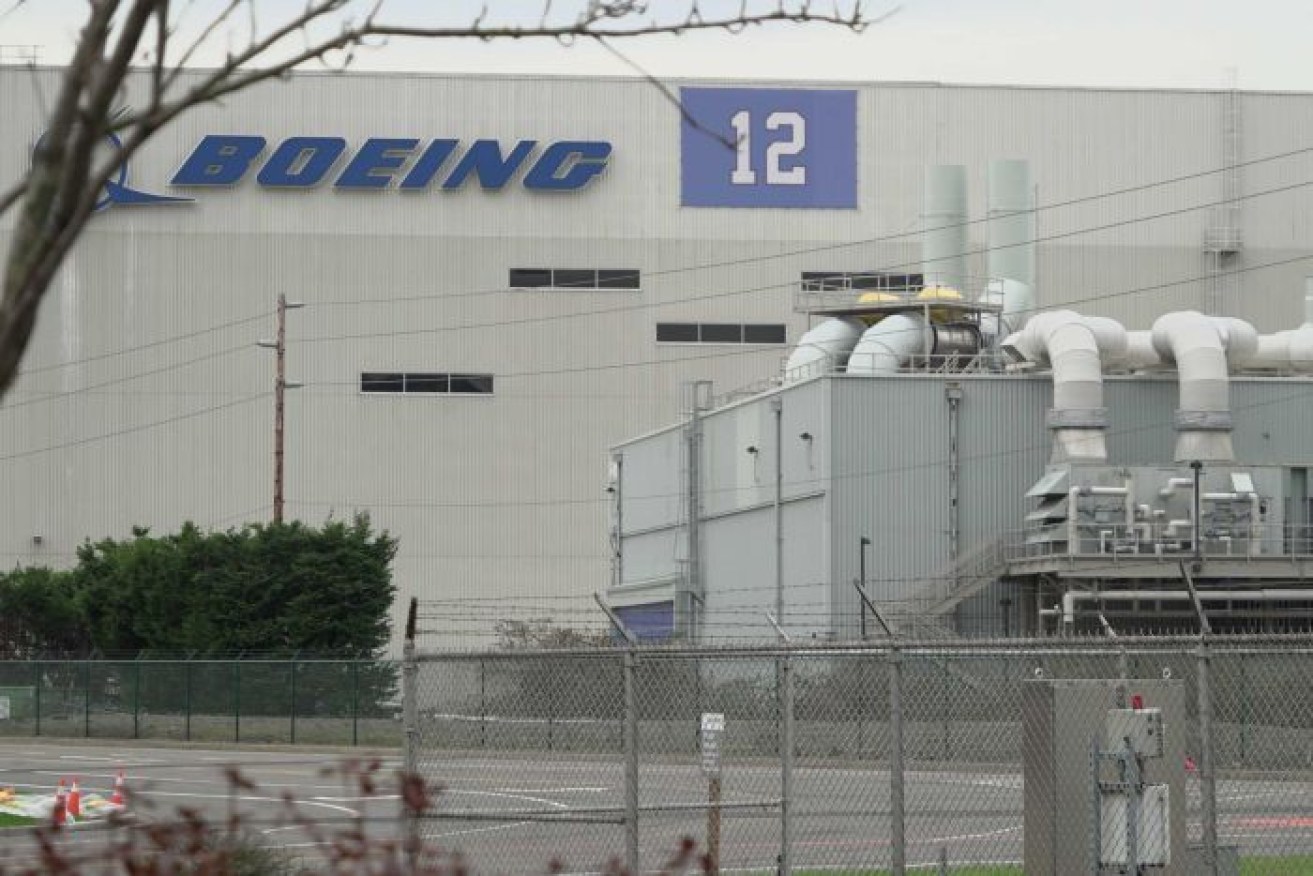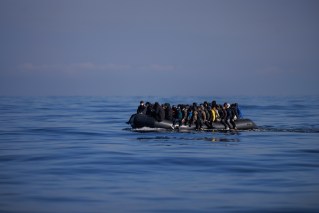Troubled 737 MAX Boeing airplane had at least 13 other safety incidents, ex-employee says

Mr Pierson said Boeing's factory workers were under pressure to compete with the company's rivals. Photo: ABC News/John Mees
A former senior manager at Boeing, who urged the company to shut down the 737 MAX factory, has revealed the fleet experienced at least 13 other safety incidents in the aircraft’s short lifespan.
Lion Air flight 610 plunged into the ocean off Indonesia in October 2018. Five months later, in March 2017, Ethiopian flight 302 met the same fate.
In total, 346 people lost their lives.
It is the worst crisis the aviation juggernaut has dealt with in its century-long history — restoring confidence in its brand while trying to stem the cashflow losses, which have surpassed $US28 billion ($41.6 billion).
“Something happened in the translation from, ‘let’s build a high-quality, safe product’ to ‘let’s get it out done on time,'” former Boeing senior manager Ed Pierson told the ABC.
Ed Pierson joined Boeing in 2008 after retiring from the Navy as a Captain following three decades of service.
He was put on the MAX program in 2015. By then, the plant was already under pressure.
The aircraft maker’s top rival, Airbus, had a head start on its new class of plane designed to cost less to run by using less fuel. Boeing was playing catch-up.
“A lot has been said about the pressure on engineers to get the plane designed and test pilots to get the plane tested,” Mr Pierson said.
“I can tell you with 100 per cent confidence that there was equal if not greater pressure being put on production workers.”
By mid-2018, Mr Pierson said the factory was in a state of “chaos,” which compelled him to raise his concerns with senior management.
“Frankly, right now all my internal alarm bells are going off,” Mr Pierson said in an email to Scott Campbell, the general manager of the 737 MAX program.
“For the first time in my life, I’m sorry to say that I’m hesitant about putting my family on a Boeing airplane.”
Concerned that workers were fatigued, making an unusually high number of mistakes and performing jobs they were not trained for, Mr Pierson made a bold suggestion and urged management to temporarily shut down the factory.
But his pleas were rejected.
“My first thought was just because we’re a profit-making organisation doesn’t give us the right to take chances like that with people’s lives,” he said.
“In the military we value life. Sometimes you take risk because that’s the mission; but that’s a conscious decision.
“When you take unnecessary risk, that’s unacceptable.”
A few months later, he retired from the company. Then in October, he watched in horror as news of the first fatal crash broke.
“I didn’t know it at the time but when I was communicating with the general manager about my concerns, the Lion airplane was in the production system,” he said.

Mr Pierson says production problems could have resulted in safety defects on 737 MAX planes. Photo: ABC News/John Mees
The two fatal crashes were caused at least in part by the plane’s anti-stall system, MCAS, which automatically pushed the plane’s nose down, leaving pilots unable to regain control.
Given the problem occurred in both fatal crashes, authorities and Boeing have focused their attention on fixing the software issue.
But Mr Pierson remains concerned production problems at the plant in the lead up to the tragedies may also have inadvertently embedded safety defects in subsequent planes.
Unable to sleep at night, Mr Pierson escalated his concerns to the highest levels of Boeing, the Federal Aviation Administration (FAA) and the National Transport Safety Board (NTSB).
“I just kept thinking of the families,” he said.
“My dad was a homicide detective and I remember as a kid, he told me how important it was to get information to investigators and for investigators to keep an open mind, so that was my intent,” he said.
But he was stonewalled by both Boeing and the safety authorities, which motivated him to do his own digging.
He discovered there had been 13 other safety incidents reported on 737 MAX jets between May 2018 and the following March, when the fleet was grounded.
Tweet from @KathrynDiss
“We’re talking about 380 or so airplanes, 13 incidents, two fatal crashes on top of that,” he said.
“That represents 4 per cent of 387, so basically one in 25 airplanes had already had a safety incident in its short lifespan.
“I don’t know about you, but I certainly don’t want my family on a flight when they lose an engine or they do an emergency landing.”
In a statement, the FAA said it “reviewed all available data” thoroughly and found no “incidents related to the MCAS software” but declined to comment further.
Mr Pierson gave evidence to a congressional committee investigating the fatal crashes and outlined the information he had managed to gather.
After initially dismissing his concerns, the FAA has now asked him to participate in an interview.
Boeing said it took Mr Pierson’s concerns “seriously” and took “appropriate steps to assess them”, adding none of the authorities investigating the fatal crashes found production conditions had contributed to the accidents.
When specifically asked about the additional safety problems, Boeing said it “thoroughly reviews incidents in coordination with regulatory authorities”.

Larry and Rosemary Brester own one of thousands of small businesses that supply Boeing with parts. Photo: ABC News/John Mees
The crisis is sending shockwaves through the company’s global supply chain with those in Washington state most acutely affected.
On the outskirts of Seattle, Larry and Rosemary Brester have made specialised parts for Boeing for more than four decades.
“For us, it’s devastating as a small company because we rely on them and their tier 1 and tier 2 suppliers to provide us with work,” Ms Brester said.
“We’re devastated not just for us, but for the entire ecosystem that supplies parts to the Boeing company.”
The Bresters, like thousands of other business owners, have heavily relied on the planes for business.
“We get auction papers in the mail from local companies that are either going bankrupt or they’re just closing the doors. They don’t see that light at the end of the tunnel,” Mr Brester said.
The husband and wife team run the six-person operation from a shed at the back of their property.
Every square inch of the factory floor is occupied with machinery, most of it decades old but maintained in perfect working order.

Mr Brester feels that Boeing is pushing too hard to increase production rates. Photo: ABC News/Kathryn Diss
A large sign hanging on the wall reads “legacies can be built in your garage,” displaying the couple’s pride of running of their own successful business for almost half a century.
Both admit that Boeing, the company they have been so proud to work for, has lost its way.
“Trying to push and increase the production rates, you can only do so much with so many people,” Mr Brester said.
“Mistakes start happening and that’s not a good thing, and it’s all based on wanting to be in competition with Airbus.
“To me that’s not a good thing; the quality falls off.”
Washington state’s rich history of aviation covers the walls — from model planes to photographs featuring the pair with aerospace greats like Buzz Aldrin.
“It’s not just Washington state, Boeing has a presence in every state in the United States — and globally — so it’s going to affect the global economy as well,” Ms Brester said.
Economists are already predicting the shutdown could shave half a per cent off America’s gross domestic product (GDP).
Australia will not be immune. It is home to Boeing’s largest manufacturing operation outside of the states, which too makes parts for the MAX.
But the financial pain is not limited to those caught up in Boeing’s supply chain.

Diner owner Lucia Roadenizer is trying to weather a spell of bad business thanks to Boeing’s production pause. Photo: ABC News/Kathryn Diss
Across the road from Boeing’s main storage airfield in Seattle sits an old American diner, Randy’s Restaurant.
It has been there so long, it is now part of the furniture.
“They’ve been our mainstay for many, many, many years and we’re hoping that will continue,” Lucia Roadenizer said.
She and her husband Richard stumbled across the diner some 40 years ago and have run the business since, embracing the state’s affiliation with aviation.
“We try to stay positive and say, ‘OK, we’re going to get through this,'” she said.
“We have so far.”
The FAA told the ABC that the 737 MAX series planes would remain grounded as long as needed, but Boeing has already told shareholders it is pinning hopes on a mid-year return to the sky.








